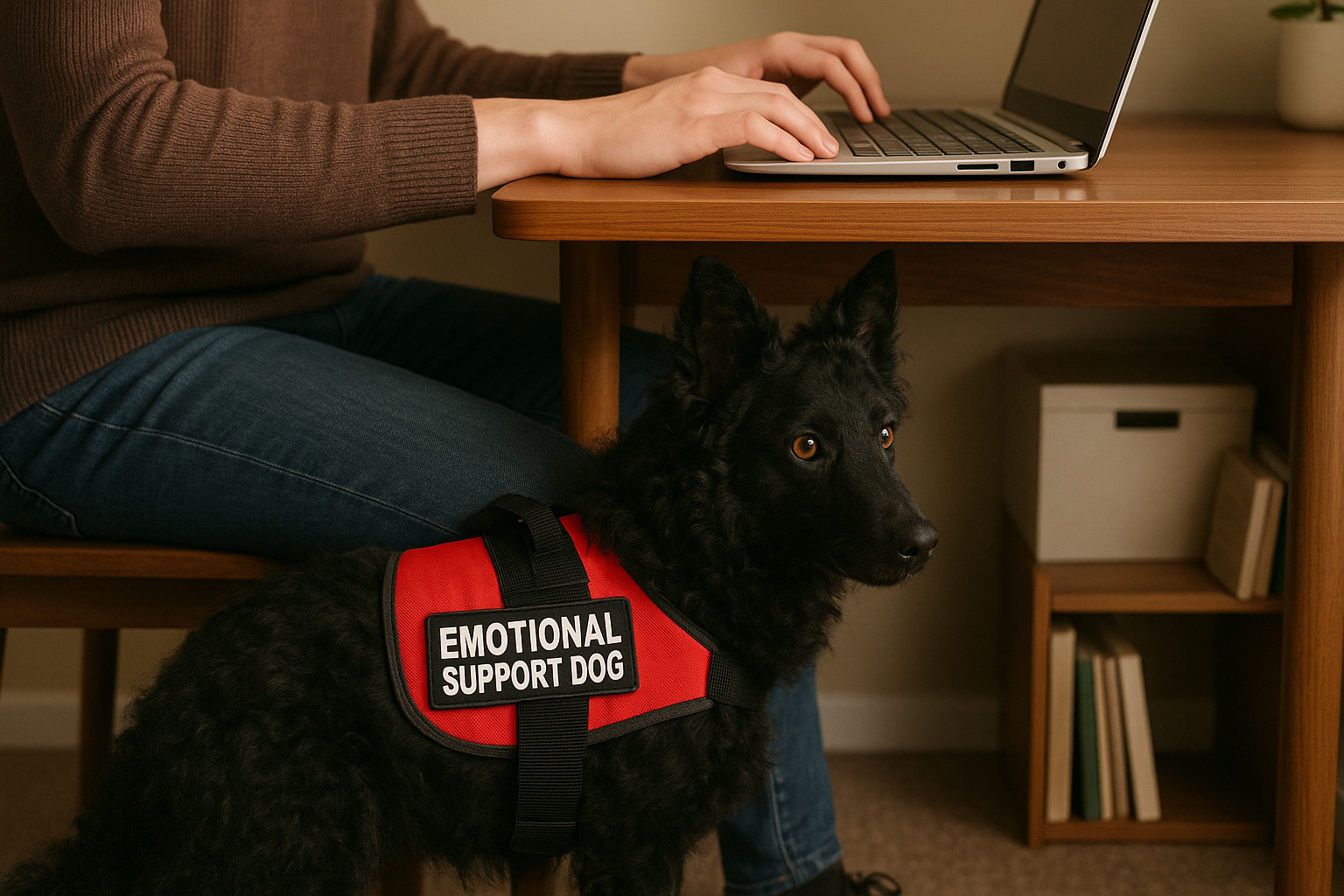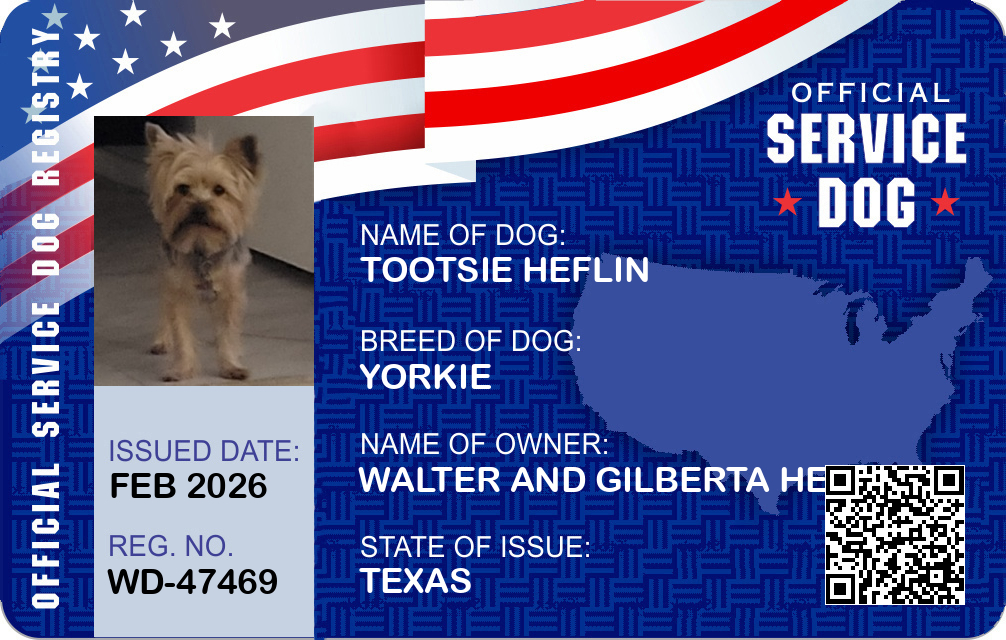Mudi as an Emotional Support Dog
Get Your Documents

The Mudi, known for its versatility and intelligence, stands out as a unique emotional support dog. While primarily recognized as a herding breed, its temperament and empathetic nature make it well-suited for offering emotional stability and companionship for people facing mental and emotional challenges.
Understanding the Emotional Support Role
Mudi Overview
The Mudi, a relatively rare breed originating from Hungary, combines agility, intelligence, and an affectionate nature. Known for its curly coat and keen expression, this medium-sized dog typically weighs between 18 to 29 pounds. Historically, the Mudi was used as an all-purpose farm dog, proficient in herding, guarding, and even hunting. Its adaptability and eagerness to learn are traits that translate well into the role of an emotional support dog, where understanding and responsiveness are critical.
Temperament and Emotional Connection
One of the Mudi’s most appealing traits is its temperament, which significantly contributes to its suitability as an emotional support animal. Mudis are innately sensitive and intuitive, making them adept at reading human emotions. Their high level of empathy allows them to discern when their owner needs comfort, providing companionship through quiet presence or playful interaction. The Mudi’s loyalty and strong bonding capacity mean it can quickly become a supportive presence, offering relief from anxiety and loneliness.
Adaptability and Daily Behavior
Mudis are highly adaptable and can thrive in various living situations, whether in a city apartment or a rural home. Their moderate size and energetic nature fit well with active individuals who can provide regular physical and mental stimulation. As a breed bred for work, the Mudi excels in engaging activities, which helps reduce anxiety and stress for both the dog and the owner. While their energy levels are high, they are not hyperactive and can settle down when necessary, offering a calming presence.
Situations Where Mudi Provides Strong Support
The Mudi excels in environments requiring emotional support due to its keen responsiveness to human cues. They can adapt well to family settings, assisting individuals with the hustle and bustle of daily life. Providing mental stimulation and companionship, Mudis are excellent for people facing stress from work or demanding life conditions. They offer a comforting presence for children and adults alike, adapting their behavior to the needs of each individual.
Ideal Living Environments
The ideal environment for a Mudi reflects its adaptability and need for connection. Mudis flourish in homes where they are integrated as part of the family, enjoying regular interaction and mental challenges. They are suitable for families, active singles, and even seniors in need of company and mild daily exercise. However, they can also adapt to smaller living spaces, such as apartments, provided they receive sufficient physical and mental stimulation outside the home.
Bonds with Different Types of People
The Mudi’s emotional intelligence allows it to form strong bonds with people of various ages and lifestyles. Their gentle nature and patience make them well-suited for families with children or for individuals dealing with emotional distress. The breed’s ability to adjust its behavior—exerting controlled energy during play or providing a calming presence during times of stress—makes it an ideal companion for those with fluctuating emotional needs.
Health, Care, and Wellbeing
Common Health Considerations
While the Mudi is generally robust and healthy, potential owners should be aware of certain health considerations. Common ailments include hip dysplasia and epilepsy, which may affect the dog’s quality of life and its ability to perform emotional support duties. Regular veterinary check-ups are crucial to ensure early detection and management, allowing the Mudi to maintain its supportive role without interruption.
Grooming, Comfort, and Maintenance Needs
The Mudi’s grooming needs are relatively low-maintenance, which is beneficial for individuals seeking an emotional support animal without demanding care routines. Regular brushing is sufficient to maintain their coat’s health and comfort. Attention should be paid to their comfort levels during activities, ensuring they are neither too hot nor too cold, which can affect their emotional stability and affect their support capabilities.
Preparing a Mudi for Emotional Support Work
Socialization and Responsiveness
Early socialization is key to preparing a Mudi for emotional support tasks. Exposure to various environments, people, and situations equips them with the confidence to adapt to their owner’s specific needs. Training should focus on responsiveness to human emotions and cues, reinforcing the natural empathy and loyalty inherent to the breed.
Managing Stress and Emotional Cues
Managing a Mudi’s stress is crucial for maintaining their emotional support capabilities. Providing a balanced routine of physical activity, mental exercises, and rest can help prevent negative behaviors associated with stress and anxiety. Owners should learn to communicate effectively with their dog, interpreting behaviors as cues to possible changes in emotional states, ensuring a harmonious supportive relationship.
Strengths, Challenges, and Ideal Homes for Mudi
Final Thoughts
Overall, the Mudi’s qualities of intelligence, adaptability, and empathy make it a strong candidate for an emotional support dog. The breed’s ability to form deep emotional bonds, paired with its adaptable nature, makes it especially suited for individuals and families seeking a loyal, perceptive partner in their emotional journey. However, potential owners should consider the Mudi’s activity needs and health considerations to ensure a supportive and fruitful companionship.
Key Takeaways for the Mudi as an Emotional Support Dog
- Best suited for: Active individuals, families, and seniors in need of companionship and moderate exercise
- Not ideal for: Inactive households or individuals unwilling to engage in regular mental and physical activities
- Emotional traits: Empathetic, intuitive, loyal, and adaptable
- Care and health notes: Requires regular veterinary checks, moderate grooming, and mental stimulation
- Environments where they provide the most comfort: Apartments, family homes, and settings with diverse lifestyle routines
In conclusion, the Mudi’s combination of intelligence, empathy, and adaptability make it an exceptional emotional support dog, capable of providing profound comfort and stability to those who need it most.
Get Your Documents
Example State Cards













